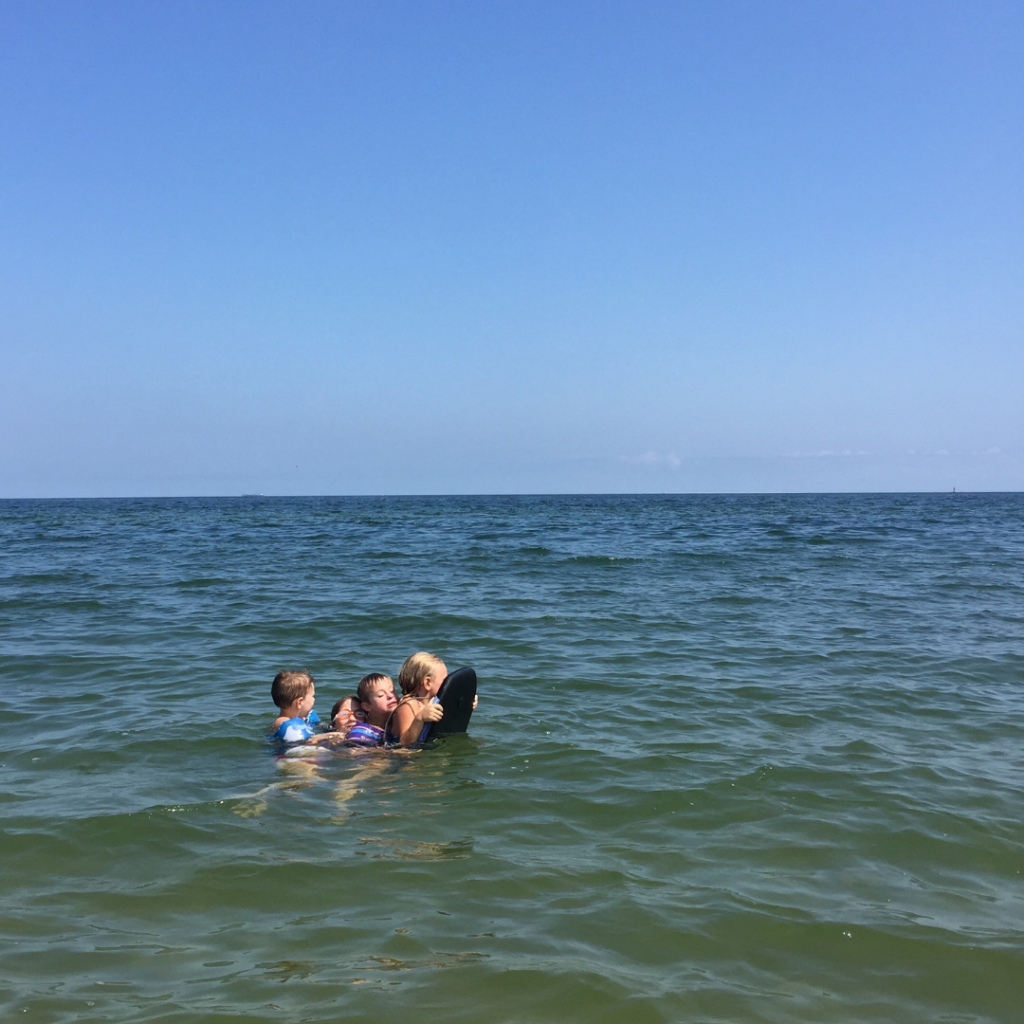
On Being a Mom in the Midst of Grief
It was a typical Friday at the end of summer. I wrangled the kids around the table, poured cereal and milk into bowls, wiped the kitchen counter, and sprayed the crack in the floor where the ants were coming in. I threw the laundry in the dryer, a load I accidentally left in the washing machine overnight. The three year old settled into my lap to hear a story while the older girls played legos at the table. Mid-morning, I applied sunscreen to six faces and we went to our favorite beach spot. The baby chased seagulls and the big kids asked me to count how long they could hold their breath underwater.
But it wasn’t just another summer day. While we were building sand castles and playing in the water, my parents were giving statements at a press conference regarding my brother’s death, which had happened ten years before. The case has never been solved, so on the tenth year anniversary, it was back in the news, making headlines and streaming through my Facebook feed.
I didn’t want to be at the beach that day. I wanted to watch the news, lay on my bed without distractions and feel sad. I wanted everyone to stop asking me questions, quit saying my name, and figure out how to make their own peanut butter sandwich.
No one tells you there are still children to care for when someone dies.
No one says you’ll have to load the dishwasher and fold the laundry after the funeral. No one tells you how to make a grocery list or buy school supplies when you’re distracted by a tragedy. No one tells you what to do on the anniversary of a death, when you’re reliving all the details, feeling every emotion you felt the day you received that phone call, and trying to manage a household.
One minute you’re reeling with the news of loss and the next minute you turn around to fix dinner, wrap a band-aid on a scraped knee, play Memory on the floor, or follow through with the eagerly anticipated beach day. Numb with our pain, we want nothing more than to hide under the covers and cry. But our family’s needs don’t afford us this luxury. We have to carry on with normal responsibilities that suddenly feel impossible. What was once second nature requires more concentration and effort and we quickly run out of steam.
But we keep going. We limp forward in pain and weakness because we’re not allowed to neglect the little people who need us.

Sometimes it feels like children hinder our grief. Their needs continue whether we feel like caring for them or not and we wonder when we’ll ever be able to process what’s happening in our lives. We want to shelter them from our pain, but also from the greater pain of this broken world. So, we cry in the shower or wipe our faces and change the subject when they enter the room. A desire to show our children the beauty in the world is right and pure. They need to know God’s good design.
But I think we’re doing them a disservice if we only share about the glory of Creation and then hurry to tell them about the gift of Jesus.
We can’t run our children to the cross without helping them understand the realities of a sinful world.
Our children need to see our tears.
We need to explain why plants die in the winter, why the beauty of lightning streaks on the horizon can sometimes result in a damaging storm. They need to know sin results in feelings like loneliness, fear, anxiety, discouragement, anger and sorrow. We must tell them everything and everyone will die one day, and that because of our sin we’re separated from a perfect relationship with God.
On the days when I’m overcome with grief, my kids know. I might put on a movie in the middle of the afternoon and say Mama needs a few minutes to herself. When friends bring us meals or we get flowers and cards in the mail, I admit my sadness is making regular life a bit harder to manage, and I just need some extra encouragement and support.
Of course there are times when I hide the weight of all I carry, but allowing opportunities for our children to witness our grief opens the door for conversations about suffering and the brokenness of this world.

Our older children have asked a lot of questions about my brother’s death over the years. When they were small, we would be brief in our response, “He died. He’s with Jesus. We don’t know why God allowed this to happen. We miss him. We’ll get to see him again one day.”
All of these things are true, but we didn’t give them every detail. It wasn’t until much later that we told them how he had died. At that point they understood good and evil. We could frame our conversation around what God’s word says and how we can still trust him in the midst of circumstances that don’t make sense and are contrary to his ways.
We’ve talked about my miscarriages. Sometimes they correct us and remind us we have eight children, not six. “Remember, two are in heaven, Mommy.” On the days when I’m overwhelmed with the challenges of raising a child with special needs, I share with my older girls my sadness over his struggles. I’ve asked them to pray for me when I need patience and strength to care for his needs. We point them to God’s word in our conversations and remind them of his character, his purposes, and his greater work in the midst of painful circumstances.
Our children need to hear us talk about our grief.
We still withhold some information from them, waiting for the right time. But we’ve seen how these vulnerable moments provide opportunities for us to inform their hearts and minds about how to grieve.

We stood in line for several hours greeting friends and family who came to offer their condolences after my brother died. By the time we arrived at my parents’ home later that evening, we were physically and emotionally exhausted. I remember sitting in the middle of the living room floor with our eight-month-old daughter, surrounded by members from our extended family, and watching as she entertained everyone. Eyes were fixed on her chubby hands, bald head and dimpled face. She smiled, laughed and showed off all her new tricks.
We didn’t forget the horror of what happened or why we were gathered, but for a few minutes we could smile and laugh because she was a delight. Her presence was a balm to everyone’s souls. Over the months that followed, our daughter continued to provide encouragement and comfort to my grieving heart as she grew and developed into a toddler.
Babies are mostly oblivious to the circumstances of our lives and our sorrow. But as children grow, they begin to notice our emotions and interact with us in the midst of them. Letting a toddler squeeze your neck when you’re visibly upset or allowing them to wipe your tears with their sticky fingers brings great comfort. I’ll never forget the day I was crying and one of my boys came and sat next to me and grabbed my hand. I’ve learned to ask my older children to help in practical ways when I’m weepy or emotionally exhausted. My children’s acts of service, words of encouragement and whispers of hope are precious gifts from the Lord.
Our children can encourage our souls in the midst of our grief
Letting our children minister to us can feel strange, maybe a bit out of place, but what a picture of love and grace. God puts us into families — and into the greater family of God— so that we can comfort, encourage, and minister to one another.

Grief for the Christian is laden with hope: we know this isn’t the end of the story. We believe Jesus’ death and resurrection are the greatest gift for us, the only way we can be saved and our only hope in life and death.
When we’re full of sorrow and weary with grief, we need the comfort of the gospel: Jesus took our grief and carried our sorrows. When we look at our children and try to explain a terrible tragedy, we need the hope of the gospel: Jesus died to save us from sin and one day, God will completely remove the curse of sin. When we’re serving up macaroni and cheese for dinner for the second time in one week, crying in the grocery store, and fumbling through our daily tasks, we need the reality of the gospel: Christ is in us and he’s making all things new.
Our children need to hear us declare the gospel through our grief.
As we cling to the truth of the gospel in the midst of our grief, we’ll be able to tell our children we need Jesus when we die, but we also need him in order to live today.
I’ve learned it’s okay to sob while you’re scrambling eggs for breakfast. You’re allowed to curl up on the couch and let your children run circles around you. You can receive help, say you’re not okay and use paper plates on the really hard days. And when you catch your breath, or find the strength to say a few words, you can whisper to your children: Jesus is with us. He loves us. He’s holding us up. Let’s trust him and watch him use our grief for his glory.


3 Comments
Elizabeth Neal
Thank you once again for such powerful words of encouragement!
Anna
Wow Lauren thankyou for this grace filled piece. I am so sorry for your pain. Thankyou for sharing how the Lord holds you up.
Leanne
Wow Lauren. A friend shared your words with me, and I can’t emphasize enough how perfect the timing is. I lost my brother, suddenly and tragically, 3 weeks ago. I am homeschooling 5 kids (9 and down), I have been feeling so guilty for our lack of structure, and yet feeling absolutely unable to do it all. I have been asking the Lord for grace with my kids when I get angry with them, and more trust and faith in who I know he is (mostly intellectually at the moment). Your words are like nourishment for my fragile heart. Literally. You were explaining to me what I have been saying in my head. And you gave me comfort in knowing my struggle, encouragement that our God is always good and right, and challenge to keep the gospel the main thing for myself and my kids while dealing with life as it happens. Thank you for taking the time to share. And I am sorry also. I am feeling your pain as well.